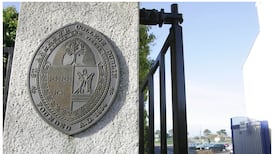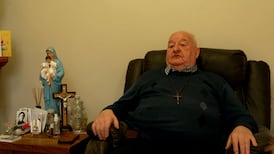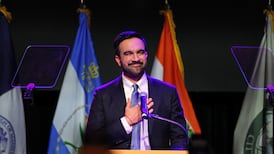WILDGEESE: EMIGRANT BUSINESS LEADERS ON OPPORTUNITIES ABROAD:Ivan Woods, Neurologist, Montreal, Canada
IVAN WOODS was watching television at home when he had his eureka moment. It was 1970, and the Montreal-based neurologist happened to be watching some fuzzy footage of astronauts walking on the moon.
A laboratory in California, the voiceover informed him, was monitoring the moonwalkers’ heart rate, blood pressure and brain activity, round the clock.
“Bingo!” thought Woods. His research into the influence of sleep on epilepsy had stalled due to the limitations of his equipment, which was only capable of monitoring brainwaves for 20 minutes at a time.
He wrote to the laboratory. Within weeks, the very same device that had been hooked up to the astronauts was sitting in his office at the Montreal Neurological Institute.
It was a first in the field that would later become standard practice around the world.
A native of Co Meath, the grocer’s son was in his second year at University College Dublin when he became obsessed with the workings of the human brain. His fascination revolved around the hypothalamus, a pearl-sized area of the brain controlling a number of bodily functions such as appetite and the sex drive.
“It occurred to me that, in that little mass of cells, you could find the seat of the human soul. I couldn’t think of anything else,” he says.
After graduating in the early 1960s, Woods was all set to take a job at Dublin’s St Vincent’s Hospital when a professor asked him whether he’d be interested in a research position at Harvard Medical School in Boston. The offer took him by surprise. “In a state of shock, I just said yes,” he says.
With the war in Vietnam heating up, he avoided conscription by opting for a visitor’s visa. Two years later, however, that status prevented him from taking up a job at Harvard.
His boss at Harvard got on the phone to the Montreal Neurological Institute, renowned for its world-class research in the field. That night, he bought an air ticket – an expense that swallowed a huge chunk of his then $400 per month salary – and the next day saw him pacing the streets of Montreal in search of a room, his mind a muddle.
Once settled, he asked the landlady where the hospital was. “She looked at me queerly and said it was just around the corner,” he remembers.
His first four years at the institute were taken up with research into sleep and epilepsy. His seniors encouraged him to embark on a PhD but, wary of being trapped in a life of research, he insisted on doing clinical work. He found the hospital’s approach to dealing with patients very theoretical, with constant reference being made to research papers. In Dublin, the approach had been more hands-on, more human.
“I was totally out of it,” he remembers.
In later years, he would make a point of passing on his Dublin experience to students, emphasising the importance of “dealing with patients as patients, not just as numbers”.
“There are no magic bullets. While infectious diseases can be treated with antibiotics, most conditions cannot be cured,” he says. Understanding this is a vital part of providing a caring service.
“I tell my students: you’re here to help people, even if their problem is just stress. That’s what medicine should be about.”
The biggest challenge of his career came after he was appointed as the institute’s director of professional services. He suddenly found himself at the centre of tricky negotiations on the relationship between the institute and the adjoining hospital.
Many of his colleagues wanted to break away from the hospital, but Woods argued that the two should remain linked, particularly since many of the institute’s patients had complex conditions requiring multidisciplinary treatment.
At stake was the institute’s considerable wealth. “The rest of the hospital had always wanted to get its hands on our money. We had to find a way of remaining part of the hospital, while protecting our money,” he says.
By his account, the episode was full of Machiavellian intrigue. “Lots of people wanted my job,” he says. “The moment you lift your head above water, you’re going to be shot.”
Tenacity is something Woods learned early in life. As the son of a grocer, nobody expected him to go into medicine. “It was easier to get into medical school if you were the son of a doctor,” he says. Despite various attempts to dissuade him from the calling, he stuck to his guns.
“People told me I shouldn’t do it, so I decided that was exactly what I wanted to do.”









